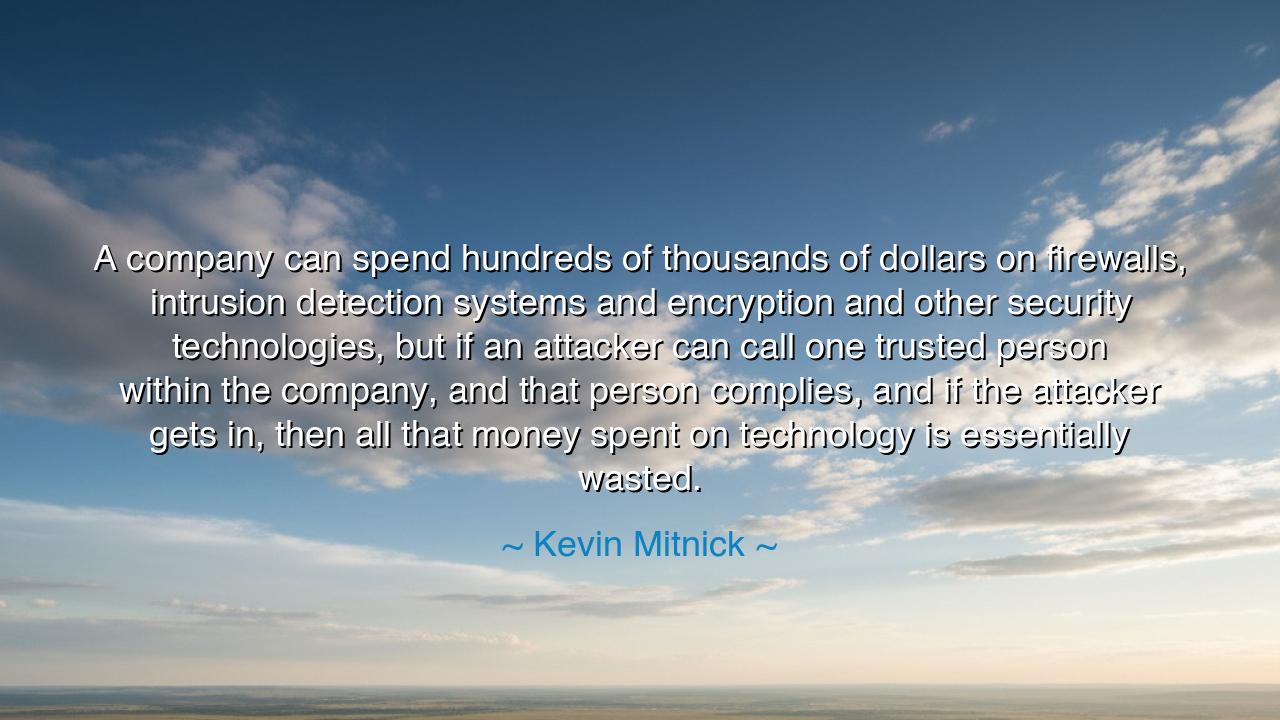
A company can spend hundreds of thousands of dollars on
A company can spend hundreds of thousands of dollars on firewalls, intrusion detection systems and encryption and other security technologies, but if an attacker can call one trusted person within the company, and that person complies, and if the attacker gets in, then all that money spent on technology is essentially wasted.






Hear the words of Kevin Mitnick, once a master of deception and later a herald of wisdom: “A company can spend hundreds of thousands of dollars on firewalls, intrusion detection systems, encryption and other security technologies, but if an attacker can call one trusted person within the company, and that person complies, and if the attacker gets in, then all that money spent on technology is essentially wasted.” This saying is not merely about machines and codes, but about the oldest vulnerability in the history of mankind: the human heart, so easily swayed by trust, fear, or persuasion.
When Mitnick speaks of firewalls and encryption, he names the great walls and fortresses of our age. In ancient times, kings raised stone walls, dug moats, and placed guards at the gates. Yet history has shown that the mightiest citadels fall not by the battering ram, but by betrayal from within, or the cunning word that opens the gate without a fight. So it is today: companies may arm themselves with layers of digital armor, but if a single human falters, all defenses crumble like sand before the tide.
The heart of this truth lies in trust. Technology defends against brute force, but men and women defend against deceit—and they often fail. The enemy need not wield a sword when a whisper will suffice. Mitnick himself, in his earlier days, used no armies of machines, but the gentle art of persuasion. He would call, ask, charm, and convince, until doors opened willingly. His victories were not against software, but against the frailty of human vigilance.
Consider the tale of Troy, whose walls were deemed impregnable. For ten long years the Greeks could not breach them. Yet it was not spear or flame that conquered Troy, but the trick of the wooden horse. The Trojans, trusting in a gift, brought their enemies inside their own gates. The lesson is as old as war itself: no defense, however strong, can withstand the folly of the human heart unguarded. Mitnick’s words are but the modern echo of that ancient ruin.
The warning is clear: security technologies are necessary, but they are not sufficient. The greatest defense lies in the awareness and discipline of the people themselves. If they are careless, if they are untrained, if they mistake the voice of an attacker for the voice of a friend, then all the riches spent on machines avail nothing. Vigilance of the human spirit is the first fortress; without it, all others fall.
Therefore, let this lesson sink deeply: in this age of endless devices and shining walls of code, never forget that the human being is the true gatekeeper. The costliest firewall cannot replace discernment; the strongest encryption cannot substitute for caution. Every individual in an organization must learn to question, to verify, to guard their trust as they would guard a treasure chest of gold.
Practical action is plain: teach, train, and remind. Let every worker know that they are part of the defense, not apart from it. Build a culture where questions are welcomed, where caution is praised, and where haste in trust is seen as folly. Just as soldiers once drilled at the gates of ancient cities, so must modern workers drill against deception. Only then can the walls of technology stand firm, joined with the vigilance of human hearts.
Thus Mitnick’s words echo through the ages: spend what you will on the armor of machines, but remember—one unguarded soul can undo it all. Guard both the code and the conscience, both the network and the mind, and then your fortress shall endure. For the greatest security lies not in steel or software, but in wisdom.






AAdministratorAdministrator
Welcome, honored guests. Please leave a comment, we will respond soon